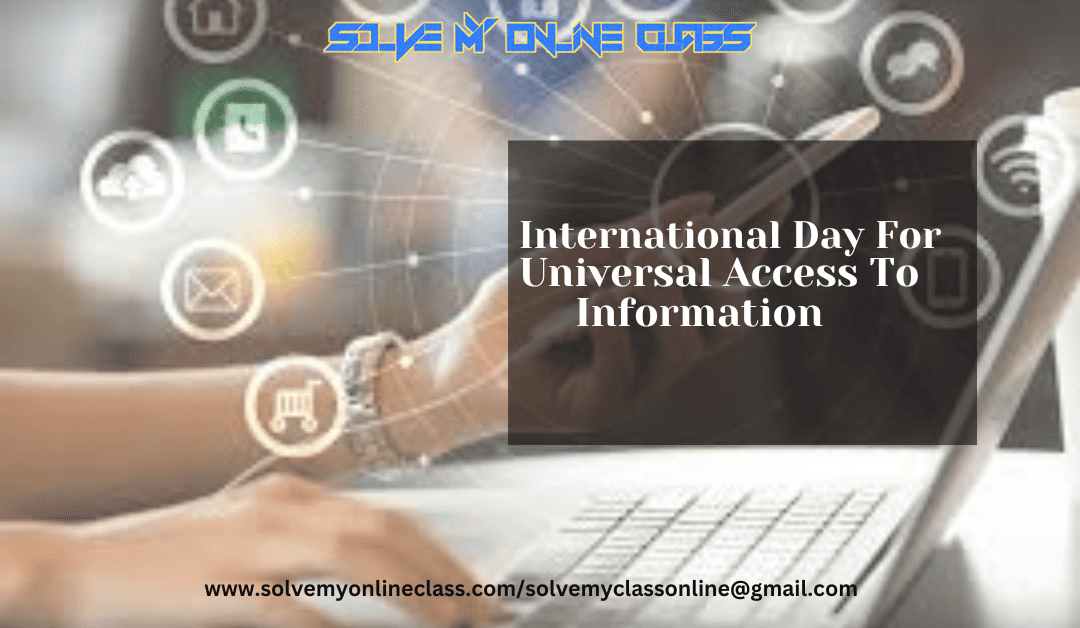Introduction:
The International Day for Universal Access to Information is celebrated annually on September 28. This day serves as a poignant reminder of the significance of knowledge in influencing our world and the necessity of guaranteeing fair access to knowledge for all people, regardless of their background or location. This festival has even more significance in the modern digital era, since knowledge is the currency of advancement.
The Importance of Universal Information Access
It is a basic human right to have access to information, not merely a high ideal. The fulfilment of other human rights, such as the right to freedom of speech, access to health care, and education, is acknowledged by the UN as being dependent on access to information. People are better equipped to make informed decisions, take part in the democratic process, and hold institutions and governments responsible when they have open access to information.
Objectivity and Accountability
The role it plays in fostering openness and accountability is one of the most important advantages of open access to information. Governments, businesses, and other organizations gain the public’s trust when they are open and transparent with their information. Because persons in positions of authority are more likely to act properly when they are aware that their actions are being closely watched, this trust in turn promotes a sense of accountability.
The ability to access information globally allows people to hold their leaders responsible. They can use it to keep an eye on government operations, keep tabs on public spending, and demand accountability for decision-making. As a result, corruption is decreased and resources are distributed more effectively for the good of society as a whole.
empowerment and education
The basis for education and self-empowerment is access to information. People can pursue learning and self-improvement in ways that were previously unthinkable when they have access to a wealth of knowledge. For instance, the internet has made it possible for anyone to access a world of knowledge, enroll in online courses, and communicate with experts from around the world.
Additionally, ensuring everyone has access to information minimizes inequality and fills knowledge gaps. It guarantees that those living in isolated or underdeveloped areas have access to the same educational resources and opportunities as those living in more affluent areas. A potent instrument for tackling social and economic inequalities is the democratization of information.
Innovation and Progress Information is the fuel that drives innovation and progress. Scientific discoveries, technological advancements, and creative endeavors all rely on the availability of information. When information is freely accessible, it encourages collaboration and the sharing of ideas, leading to breakthroughs that benefit society as a whole. In the business world, access to market data, consumer trends, and competitive intelligence is crucial for making informed decisions and staying competitive. Universal access to information helps level the playing field for businesses of all sizes and fosters a culture of innovation that drives economic growth.
Issues with Universal Access
Despite the obvious advantages of having free access to knowledge, there are still several obstacles to be overcome. The ability of people to access the global knowledge network is hampered in many places of the world where internet connectivity is still scarce or prohibitively expensive. Information availability is also threatened in many places by censorship and limits on free speech.
Another difficulty is digital literacy. Even when information is readily available, not everyone possesses the abilities and expertise necessary to successfully navigate the digital world. In order for everyone to benefit from the information age, efforts must be made to encourage digital literacy.
promoting global accessibility
Governments, organizations, and people can take the following actions to support universal access to information:
Governments ought to pass and implement laws that support and safeguard public access to information. Laws governing access to information can be effective tools in this regard.
Spend money on digital infrastructure to increase internet access in underserved areas. Building broadband networks and enhancing connection in remote areas fall under this category.
To guarantee that people have the abilities and knowledge to use digital tools effectively, promote digital literacy programs.
Open Data: Unless there are good reasons for confidentiality, governments and businesses should make data open and available by default.
Support groups and projects that fight for unrestricted access to information and the right to free speech.
Education: Include information literacy in school curricula to give the next generation the abilities they need to sift through the information available.
Conclusion:
The International Day for Universal Access to Information acts as a gentle reminder of the information’s revolutionary potential. It is a day to acknowledge the strides we have achieved in enhancing knowledge accessibility and to consider the work that still needs to be done. Ensuring universal access is important for justice, empowerment, and advancement in a society that is becoming more interconnected and reliant on information. Let’s keep advocating for information access for all people and work to create a more knowledgeable, just, and democratic world.






